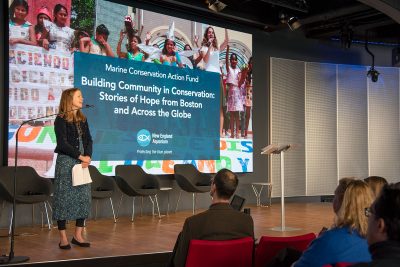Kalani Quiocho, a native Hawaiian who works toward increasing awareness and integration of Hawaiian values, sang a song about the islands’ journey at WBUR CitySpace on Saturday.

Quiocho, a program specialist for the National Oceanic and Atmospheric Administration’s Office of National Marine Sanctuaries, performed the song to those gathered at WBUR CitySpace Saturday and described the relationship between culture and nature in the context of building community through conservation.
More than a dozen panelists — including researchers, scientists and environmental conservationists — discussed the current state of the oceans and the difficulties of conservation at Saturday’s symposium titled, “Building Community in Conservation: Stories of Hope from Boston and Across the Globe.”
Many of the speakers were fellows of the Marine Conservation Action Fund, which aims to ensure that local and global conservation leaders have the resources and support to achieve key ocean conservation gains, and had been in effect for 20 years, according to the Anderson Cabot Center for Ocean Life at the New England Aquarium website.
Elizabeth Stephenson, program officer and chair for the Marine Conservation Action Fund, said the New England Aquarium organized the program to discuss how they build community around conservation initiatives and potential conservation solutions.
“We want to really respect and elevate and support local knowledge and local people working in these environments and help them to protect their ocean,” Stephenson said. “Because they know best …what the challenges are and what the approaches should be.”
Daniel Fernando, co-founder of Blue Resources Trust, a marine research and conservation organization based in Sri Lanka, spoke at the event about the development and implementation of policies to encourage a shift towards sustainable fisheries.
Fernando said in an interview that the oceans are not in a good state because of climate change and the negative effects of pollution from both plastics and industries.
“We as individuals must recognize that these are issues, we must accept them and realize that every one of us can do something about it,” Fernando said. “Because I think there are a lot of people who are aware there are problems, but they say ‘there’s nothing I can do about it, it’s somebody else’s problem.’”
Fernando said there needs to be a group of people to support and inform politicians to make the right decisions moving forward and he looked to the younger generation to do so.
“I think this is the key point, that we have to put sufficient pressure on these politicians so that they actually make some positive changes,” Fernando said.
Karl Louis Uy, an environmental scientist who was in attendance, said after the event that he enjoyed hearing about the different kinds of work people are doing.
“I think it’s very important that these different people from different walks of life and many different organizations or entities are coming together to have these kinds of discussions, telling each other’s stories,” Uy said, “because it is stories that engage people, get them to pay attention and get them to care about each other.”




















































































































Anonymous • Nov 7, 2019 at 7:42 pm
Hi. I have a question for the author. Please contact me. Thank you.